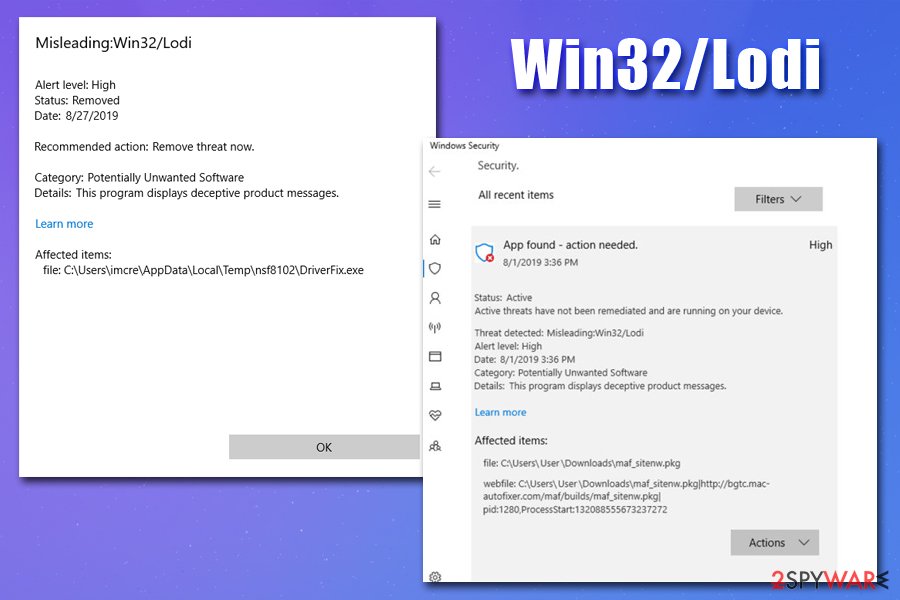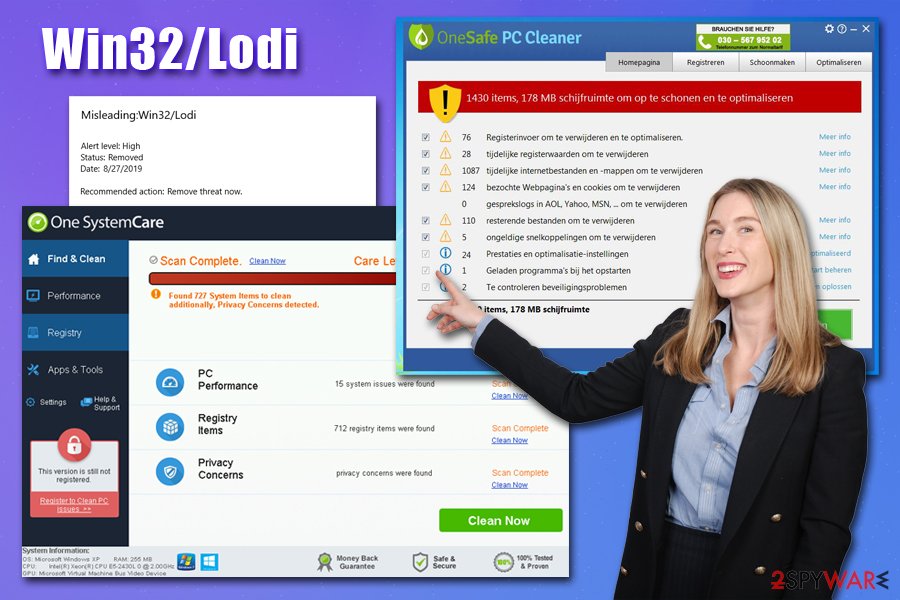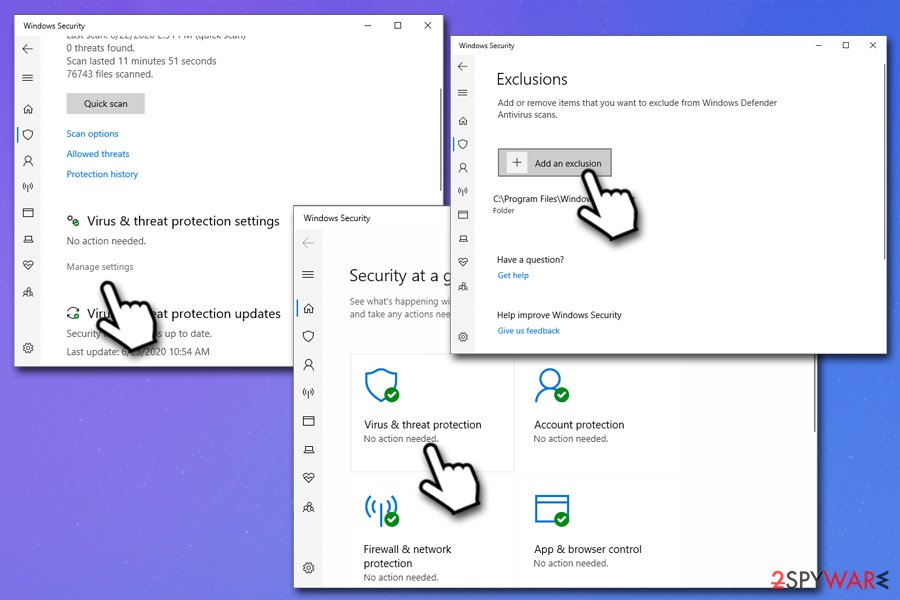Win32/Lodi is a heuristic detection used to describe applications that use misleading diagnostic results about computer health

Win32/Lodi is a potentially unwanted application that tries to mislead users into purchasing its full version by showing fake scan results

Win32/Lodi is a potentially unwanted application that tries to mislead users into purchasing its full version by showing fake scan results
Win32/Lodi is a generic name that is applied to applications that are of dubious or sometimes malicious origin. Since the detection represents heuristic[1] signature, it means that Windows Defender or another security software can flag apps like One System Care, Advanced System Repair, OneSafe PC Cleaner, and many others. While these programs are technically not as dangerous as ransomware or other high-risk malware, the full detection name is Misleading:Win32/Lodi.
Win32/Lodi virus can access your PC without your permission – yet another reason why security software often flags it. In most cases, misleading, potentially unwanted applications are distributed via software bundle packages downloaded from third-party websites, or fake update prompts/false virus alerts.
Nonetheless, since Win32/Lodi is a generic detection, it also can sometimes be a false-positive, where applications are flagged due to certain behavioral patterns that anti-virus recognizes as potentially malicious, although they are not. If your anti-malware detected a threat, you should definitely investigate further.
| Name | Win32/Lodi, Misleading:Win32/Lodi |
| Type | Potentially unwanted program, scareware, misleading, hoax[2] |
| Distribution | In most cases, users install potentially unwanted applications unintentionally after being tricked by a fake update prompt, attractive advertisement, or a software bundle package |
| Symptoms |
|
| Risks | Installation of misleading software or malware, financial losses, personal information (credit card details) disclosure to potentially unsafe sources when buying the full version of the app, etc. |
| Termination | To uninstall a potentially unwanted program, follow the instructions below. In case the detection is a false-positive, add it as an exception via your security app’s settings |
| Optimization | In case you need a trustworthy app that can help you fix Windows errors, damage caused by malware and stop the PC from crashing, we recommend using Reimage Reimage Cleaner Intego |
The principle of Win32/Lodi operation is relatively simple – it uses deception and social engineering[3] to make users purchase products that are worthless. In many cases, such apps can be encountered on malicious websites that display fake pop-up messages, which incline about alleged problems on the computer. For example, fake Flash Player prompts are often used for the purpose:
“Adobe Flash Player” is out of date
To continue using “Adobe Flash Player”, download the updated version.
Another misleading technique used by crooks for Win32/Lodi distribution is software bundling and is conducted based on users’ inability to install freeware apps carefully. They rush the installation process and always choose Recommended settings. As a result, suspicious and even malicious apps get installed on the device without direct approval from end-users.
In case you have a security application installed, it would immediately stop the installation of misleading apps and inform about it in a pop-up message. However, you should not hurry with Win32/Lodi removal, as it might be a false positive – a legitimate program might be flagged as suspicious or malicious despite being legitimate.
To find out whether the app is actually malicious, you should scan the machine with alternative security software or upload the executable to analysis services like Virus Total. In case the app is safe, and the detection was indeed a false-positive, there is no need to remove Win32/Lodi, and an exception within the security app should be added – we explain how below.
However, if you bypassed the Win32/Lodi virus warning, you could have installed potentially unwanted programs on your Windows computer. In most cases, these apps fall to scareware, scamware, hoax, and similar categories. The main focus of such apps is to show users misleading scan results about outdated drivers, malware infections, exaggerating the impact of found items. In many cases, these “issues” are harmless and would not cause any issues to your machine.

Win32/Lodi is a heuristic detection name applied to hoax and misleading apps

Win32/Lodi is a heuristic detection name applied to hoax and misleading apps
The developers of the Win32/Lodi virus rely on users’ lack of computer knowledge and try to intimidate them by showing fake detection results. Quire often, reg color, flashing messages, frequent reminders, ads, and other intrusive behavior is common. If victims want to fix these fake issues, however, they are directed to the payment page, where they are asked to purchase a full version of the app. This is a cleverly engineered scam that is surprisingly effective, and unfair individuals manage to fool many using such a scheme.
While many of fake system optimization tools can be fake, misleading, and be flagged as Win32/Lodi, it does not mean that all tools of such kind are bad. If you are looking for a tool that could help you to free up space, check the security of apps, fix registry errors, repair the OS after malware infections, we recommend using Reimage Reimage Cleaner Intego.
Learn to avoid potentially dangerous apps to keep your PC safe
In many cases, potentially unwanted programs do not pose a significant danger to computer users. These apps are typically installed by users themselves (even though unintentionally), and cause ads, computer slowdowns, and other nuisances. Nevertheless, clutter on your PC might sometimes indicate much more serious problems, as they can weaken built-in defenses and might eventually lead to malware infection. As a result, users’ data might be at risk of being stolen, personal files encrypted (lost), etc.
Therefore, even if adware or similar unwanted software might not pose significant risks, avoiding such software will make sure that your computer stays clutter-free and will not display intrusive ads on a regular basis. Here are some tips from bedynet.ru researchers that can help you accomplish just that:
- Install robust security software and enable PUP detection feature;
- Before installing an app, check for advice online – read blogs, forum posts, reviews, etc.;
- If possible, only download apps from official sources (e.g., Microsoft Store);
- Always pick Advanced/Custom mode when you are offered to do so, as it will allow you to get rid of all optional components before the installation is complete;
- Never trust fake update prompts. If you are still using Flash Player, only download it from the official website;
- Virus alerts within the web browsers are always fake – never download anything and exit the page immediately.
Terminate Win32/Lodi if it’s a threat, add an exclusion if it is a false-positive
Initially, whether you have to perform Win32/Lodi removal or not depends on several factors, which can differ from person to person. First of all, if you started a download of an alleged update or an app from an unknown site and your security app flagged it, you should most likely eliminate it, although you can go further research online. For example, you could upload the executable to Virus Total and check how other security vendors are treating it.
For potentially unwanted program elimination, you can use our manual guide below, or uninstall Win32/Lodi virus automatically by using security software.
However, if you used the certain app for a while and you suddenly were shown this detection, you should not remove Win32/Lodi, as it is most likely a false-positive. Should you have any doubts, we recommend contacting the developers/distributors of a particular application and make sure. Then, you can add the program as an exclusion. If you are using Windows Defender, follow these steps:
- Right-click on Start button and select Settings
- Go to Windows Security and select Open Windows Security
- Click on Virus & threat protection
- Scroll down to Virus & threat protection settings and click Manage settings
- Find Exclusions section and click on Add or remove exclusions

In case Win32/Lodi is a false positive, add the file or folder to the exclusion list - Click on Add an exclusion and pick File/Folder
- Locate the downloaded app and choose Open.
You may remove virus damage with a help of Reimage Reimage Cleaner Intego. SpyHunter 5Combo Cleaner and Malwarebytes are recommended to detect potentially unwanted programs and viruses with all their files and registry entries that are related to them.
Online spying has got momentum in recent years and people are getting more and more interested in how to protect their privacy online. One of the basic means to add a layer of security – choose the most private and secure web browser. Although web browsers can’t grant a full privacy protection and security, some of them are much better at sandboxing, HTTPS upgrading, active content blocking, tracking blocking, phishing protection, and similar privacy-oriented features.
Nevertheless, there’s a way to add an extra layer of protection and create a completely anonymous web browsing practice with the help of Private Internet Access VPN. This software reroutes traffic through different servers, thus leaving your IP address and geolocation in disguise. Besides, it is based on a strict no-log policy, meaning that no data will be recorded, leaked, and available for both first and third parties. The combination of a secure web browser and Private Internet Access VPN will let you browse the Internet without a feeling of being spied or targeted by criminals.
While much of the data can be accidentally deleted due to various circumstances, malware is also one of the main culprits that can cause loss of pictures, documents, videos, and other important files. Potentially unwanted programs may clear files that keep the application from running smoothly.
More serious malware infections lead to significant data loss when your documents, system files, or images get locked. Ransomware is the one that is focused on such functions, so your device gets useless without access to needed data. Even though there is little to no possibility to recover after file-locking threats, some applications have features for such recovery in the system.
In some cases, Data Recovery Pro can also help to recover at least some portion of your data after data-locking virus infection or general cyber infection.


